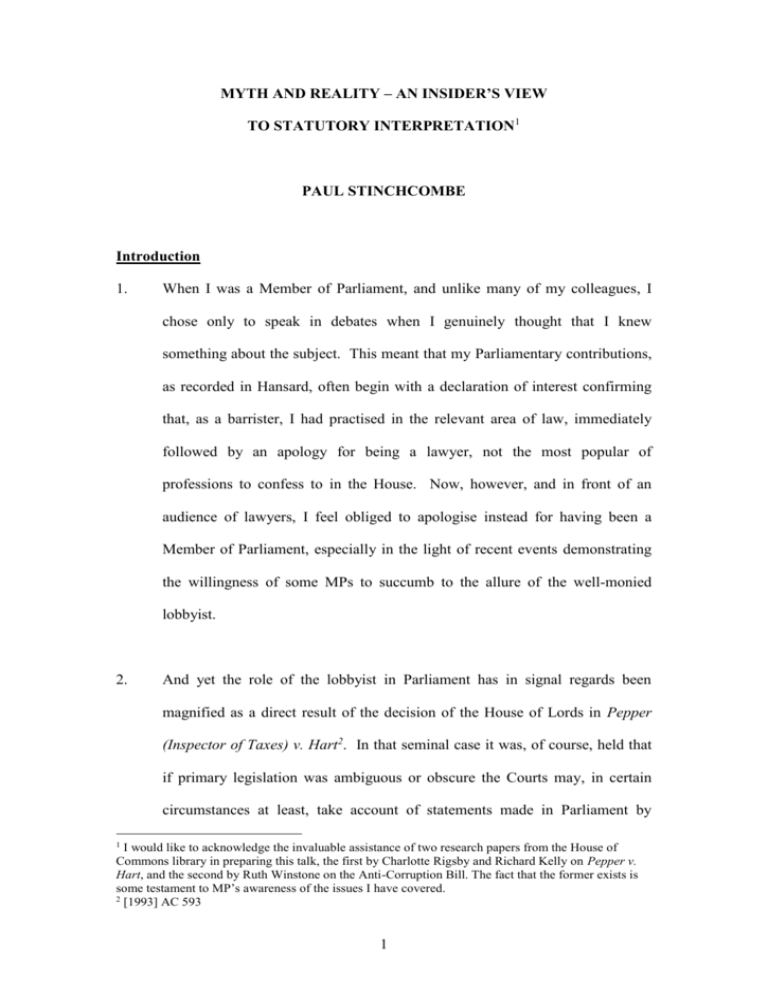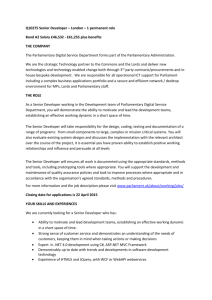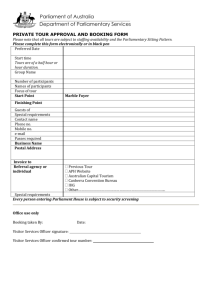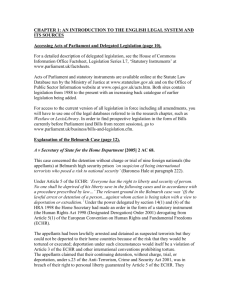Myth and Reality - The Constitutional & Administrative Law Bar
advertisement

MYTH AND REALITY – AN INSIDER’S VIEW TO STATUTORY INTERPRETATION1 PAUL STINCHCOMBE Introduction 1. When I was a Member of Parliament, and unlike many of my colleagues, I chose only to speak in debates when I genuinely thought that I knew something about the subject. This meant that my Parliamentary contributions, as recorded in Hansard, often begin with a declaration of interest confirming that, as a barrister, I had practised in the relevant area of law, immediately followed by an apology for being a lawyer, not the most popular of professions to confess to in the House. Now, however, and in front of an audience of lawyers, I feel obliged to apologise instead for having been a Member of Parliament, especially in the light of recent events demonstrating the willingness of some MPs to succumb to the allure of the well-monied lobbyist. 2. And yet the role of the lobbyist in Parliament has in signal regards been magnified as a direct result of the decision of the House of Lords in Pepper (Inspector of Taxes) v. Hart2. In that seminal case it was, of course, held that if primary legislation was ambiguous or obscure the Courts may, in certain circumstances at least, take account of statements made in Parliament by 1 I would like to acknowledge the invaluable assistance of two research papers from the House of Commons library in preparing this talk, the first by Charlotte Rigsby and Richard Kelly on Pepper v. Hart, and the second by Ruth Winstone on the Anti-Corruption Bill. The fact that the former exists is some testament to MP’s awareness of the issues I have covered. 2 [1993] AC 593 1 Ministers, or other promoters of a Bill, when construing that legislation. Before Pepper v. Hart, using Hansard in that way would have been regarded as a breach of Parliamentary privilege. After, however, there was yet another route by which Parliamentary lobbyists could seek to influence political events in their favour - by seeking to secure, through the intervention of a backbencher in debate, a comment from the Minister upon the meaning of a troublesome provision within a Bill, with a view to influencing thereafter the interpretation given to that provision by the Courts. 3. In this brief talk what I intend, therefore, is – first - to analyse the rule within Pepper v. Hart, and how it has been developed and applied, and to consider also the objections voiced to that decision, especially in the dissenting judgment of Lord McKay, in order to assess the extent to which his fears have become reality; and then take you through a brief history of real-life examples from my Parliamentary experience as to how the wording of certain Bills came to be enacted, exposing the limitations within which MPs operate when seeking to influence both Government and the interpretation of statutes, even though fully mindful of the opportunities afforded to them by decided law. 4. This is not, then, an academic treatise on how to interpret legislation, so much as brief foray into the law related to Parliamentary statements and their admissibility in Court, followed by an insider’s view on how legislation comes to be passed. 2 The Rule in Pepper v. Hart 5. The facts of Pepper v. Hart are less well-known than its outcome, but deserve a brief mention in order to put that outcome in context. 6. Mr Hart was a schoolmaster at a private school which operated a concessionary fee scheme. The scheme allowed members of staff to have their sons educated at the school at reduced fees, but only if surplus places were available. Surplus spaces were available, however, and a schoolmaster, Mr Hart, had paid reduced fees for his child’s private education. The question which arose was how the benefit provided by that scheme to Mr Hart was to be taxed. 7. Tax was payable by Mr Hart on “the cash equivalent of the benefit”. However, the statutory definition of that phrase was unclear. During the Committee stage of the Finance Bill, though, the Financial Secretary to the Treasury had indicated that the basis of taxation for such a benefit would remain the “cost to the employer of providing that service”. When pressed in the House, the Minister had stated that this meant the “extra cost caused by the provision of the benefit in issue”. In that event, and because boys educated through the concessionary scheme were filling empty places only, the extra cost to the employer would be negligible, as would be the tax to be paid. However, and relying on the wording in the Act rather than the words of the Financial Secretary at the dispatch box, the revenue taxed a proportion of the total cost of providing the services in question. 3 8. When the matter came before the Judicial Committee of the House of Lords it was decided that clear statements made in Parliament concerning the purpose of legislation in course of enactment may be used by the Court as a guide to the interpretation of ambiguous statutory provisions. To do so, it was held, would not infringe Article 9 of the Bill of Rights (which prevented speech, debates and proceedings in Parliament from being questioned in Court) since, far from questioning the independence of Parliament and its debates, the Courts would in fact be giving effect to what was said and done there. As Lord Browne-Wilkinson said: “… there is no desire to impeach ... privileges in any way. Your Lordships are motivated by a desire to carry out the intentions of Parliament in enacting legislation … The purpose is to give effect to, not thwart the intentions of Parliament.” 9. As Pepper v. Hart has come to be applied, and as acknowledged in Wilson & Others v. Secretary of State for Trade and Industry3, it therefore bears close analogy to the broader doctrines of legitimate expectation in public law. In essence, and in appropriate cases, when interpreting statutory words the Court considers that the Executive is required to honour any legitimate expectations created by the words which Ministers use when promoting that statute through Parliament. 10. Indeed, there is no bar to statements in Parliament founding the basis for a legitimate expectation more generally4. It should be noted, however, that 3 [2003] UKHL 40 See: R (Abbasi) v. Secretary of State for Foreign and Commonwealth Affairs [2002] EWCA Civ 1598; R (Association of British Civilian Internees: Far East Region v. Secretary of State for Defence [2003] QB 1397; and R (Wheeler) v. (1) Office of Prime Minister (2) Secretary of State for Foreign and Commonwealth Affairs [2008] EWHC (Admin) at paragraph 53 4 4 substantive success in such cases can be difficult to come by. In Barbone and Ross v. The Secretaries of State for Transport and for Communities and Local Government5, a challenge to the decision of the Government to permit 10 million additional passengers each year at Stansted Airport, part of the argument concerned the Government’s promise to Parliament that at any Planning Inquiry into a proposal promoted by a White Paper, such as the expansion of aviation at Stansted: “... the Inspector will consider the economic effects ... We in no way dispute the importance of rigorous economic assessment and its role in any analysis of a major infrastructure project and in the debates which are necessary at the planning level.” Notwithstanding that relatively clear assurance, however, the Secretaries of State decided that when opponents of expanded aviation led uncontested evidence at the Inquiry to the effect that it would cause a widening in the UK balance of trade by £12.6 billion they were illegitimately challenging Government policy contrary to Bushell v Secretary of State for the Environment6. Moreover, the High Court agreed7. (However, the correctness of that decision might now be in question following R (LB Hillingdon) and Ors. v. Secretary of State for London and Ors., a subsequent challenge in relation to Heathrow8). 11. So far as the direct application of the rule in Pepper v. Hart is concerned, the Courts have on occasion been more adventurous. For example, in Wilson and Others v. Secretary of State for Trade and Industry9, it was held that the Court 5 [2009] EWHC 463 (Admin) [1981] AC 75 7 [2009] EWHC 463 (Admin) at paragraph 50 8 [2010] EWHC 626 (Admin) at paragraphs 54-63 9 [2003] UKHL at 67 6 5 could even look to words uttered by Ministers when promoting legislation “to evaluate the proportionality of the legislation”; and whilst the Court sought to distinguish that exercise from the impermissible one of evaluating “the Minister’s exploration of the policy options or of his explanations to Parliament”, this being a contravention of Article 9 of the Bill of Rights, the boundary between the two seems vague to many Parliamentarians and even to some lawyers. 12. The rule in Pepper v. Hart has even been extended to apply not just to the words uttered by Ministers in the Parliamentary debate, but to the words written in the Explanatory Notes to Bills. Indeed, in R (Westminster City Council v. National Asylum Support Service10, Lord Steyn inferred that Explanatory Notes were admissible even where the statute was unambiguous, stating that: “Insofar as the Explanatory Notes cast light on the objective setting or contextual scene of the statute, and the mischief at which it is aimed, such materials are therefore always admissible as aids to construction.” In particular, Lord Steyn was of the view that Explanatory Notes were more informative in the interpretation of legislation than reports of the Law Commission or Advisory Committees, or even Government Green or White Papers, since the connection of the Explanatory Notes with the shape of the legislation was closer than with these other pre-Parliamentary aids, all of which were already admissible. 10 [2002] UKHL 38 6 13. Hence, where a clear assurance is found in Explanatory Notes, given by the Executive to Parliament about the meaning of a clause, that assurance is in principle admissible against the Executive in any proceedings where the Executive has sought to place a contrary contention before the Court. This, Lord Steyn said, reflected the actual decision in Pepper v. Hart, which was not to treat Government comments about the scope of statutory language as reflecting the will of Parliament, but to see what was the intention expressed by the words which were enacted. Misgivings about Pepper v. Hart 14. Lord McKay had voiced several concerns about the implications of Pepper v. Hart in his own dissenting opinion in that case. 15. Firstly, Lord Mackay worried that lawyers would be obliged to consult Hansard as a matter of course, thus leading to longer and more costly cases. Since the only people who have their own library of Hansard are MPs and former MPs (who are given them for nothing during their time in the House), he would have had a point but for the development of Hansard as an online resource. Since that technical innovation, however, his concern on practical grounds as to the cost and time taken to search Hansard volumes has obviously decreased, even if lawyers do now feel obliged to undertake additional research into Parliamentary debates. 16. Secondly, Lord McKay was concerned about possible over-reliance on Hansard in statutory interpretation cases. However, although Pepper v. Hart 7 has been referred to more often than the conditions for admission would seem strictly to support, in R v. Secretary of State for the Environment, Transport and the Regions ex parte Spath Holme Limited11, the House of Lords have purported to insist that the conditions for admissibility be strictly complied with in order to reduce the amount of Parliamentary material relied upon. 17. Other concerns have been raised by academics. That of Sir Rupert Cross in “Statutory Interpretation”, where he quotes Reed Dickerson (the American authority talking about proceedings in Congress), rings particularly true to me as a former MP remembering the debates in which I participated in the Commons: “Not only are they laden with sales talk, but their frequent references to what a provision means is an unconscious effort to finesse, delicately manipulate, the Courts in performing their constitutional function of having the last word of what the statute means.” The only qualification I would add is that, on occasion, the effort is not unconscious at all, but fully conscious and entirely deliberate. For example, during the 1994 debate on the Education Bill a Minister was expressly invited to give an interpretation “under the ruling in Pepper v. Hart”. The reality is that, whether under the influence of lobbyists, constituents or even conscience, Members of Parliament will often seek to secure from a Minister clarification as to a draft provision’s intended meaning in the hope that reliance can later be placed upon the same should the matter ever come to Court. The Practicalities of Law Making MPs, Lobbyists and the Executive 11 [2001] 2 AC 349 8 18. That is not to say that all such endeavours are cynical, or intended other than to be helpful to the production of good legislation. Indeed, all Members of Parliament will have been pressed by constituents or concerned groups not just to secure from the Minister a helpful comment with a view to subsequent interpretation, but substantive amendments also. 19. For example, I was lobbied by numerous members of ALBA to table an amendment to the Human Rights Bill during its passage through the Commons, seeking to secure incorporation of the right to a remedy. I duly tabled that amendment, having been fully briefed as to the benevolent consequences of it by colleagues far more expert in the area than myself. Upon doing so, I received the expected invitation from the Whips Office to discuss my impudence - the exact words were “Who do you think you are? Arsehole and Arsehole, Solicitors?” As a very junior MP, and not then a very rebellious one, I duly removed my name from the amendment, albeit that another name remained so that the amendment could still be debated. 20. Before withdrawing my name, however, I was canny enough to secure the promise of a meeting with Jack Straw, the then Home Secretary, to press my case in person. The meeting was enlightening. 21. I met Jack in the lobbies when voting on another Act. He gave me his first reason for non-incorporation of the right to a remedy. Forewarned by my expert lobbyists, I pointed out the error of his thinking. He proffered a second suggested reason for resistance, and again I was able to meet it having been 9 forewarned of this possibility. Likewise with a third reason and a fourth. It was only then that Jack commented that since I had clearly been briefed by people who knew what they were talking about, he would volunteer what he conceded was “the true reason”. When he had asked Gordon, he said contritely, he had been told to f*** off. The Treasury would never allow legislation to be enacted if its cost implications were uncertain. 22. That was just one early, and very practical, lesson learned as to how and why legislation comes to be enacted in the form finally passed. The myth that Parliamentary scrutiny will lead to amendment more usually gives way to the hard reality of practical politics. 23. That is not to say that backbenchers will supinely give in, rather than do all that they can to either to amend legislation during its passage through Parliament or to use Pepper v. Hart to nuance a statute’s subsequent interpretation. It does, however, lead to genuine difficulties in achieving a result. Let me identify, then, just a few of the practical problems before drawing some conclusions. Parliamentary Procedures and Backbench Influence 24. You will all know the broad procedures by which legislation is promoted through Parliament – the three Readings of an Act, the Committee stage, the Report on the Committee stage, and the ping-ponging of emerging legislation between the Commons over which the Executive wields such power and the less compliant, unelected Lords. The constitutional myth is that through such 10 procedures legislation is scrutinised and polished by both elected members of the House of Commons and appointed experts in the Lords, clause by clause. Myth, though, largely it is. Explanatory Notes – Primary Legislation and Delegated Legislation 25. For example, if it is the case that Explanatory Notes are in principle admissible as aids to interpretation, I know of no ways in which a backbench MP can have any prior influence upon their contents. They would be published with the Bill, and ready for collection in the Order Office, but their contents would not susceptible to any prior scrutiny or debate. Whereas before I was an MP I had some exposure to emerging policy – for example when Shadow Ministers sought the advice of outside expertise from perceived friends experienced in the relevant - I had almost none as an elected backbencher. Still less was I invited to make any prior comment upon how policy was to find its ultimate expression in legislative words – save when serving on a Pre-legislative Scrutiny Committee – an experience I will come on to at the end of this talk. 26. So far as delegated legislation is concerned, any Explanatory Notes would usually only even be available to backbench MPs upon arrival in the Committee Room itself, where they would be on a table for collection and reading immediately prior to consideration of the draft Instrument in question. That means not just that a backbench MP cannot influence their contents, but that he or she has scant opportunity even to digest their contents before debate. (Although that in part is reflective of the general lack of MP interest in delegated legislation – service on a Standing Committee into Statutory 11 Instruments is routinely seen as a chore which has to be sat through, not a genuine opportunity to participate). Keeping up-to-date with Parliamentary Business 27. A further impediment to the exertion of influence is the practical difficulty in simply keeping up-to-date with Parliamentary business, even on Bills of considerable importance and personal political interest, so as to have sufficient time to consider the Parliamentary contribution one would like to make. 28. Although those backbench MPs with a low case load and/or friends in high places will have time and opportunity to obtain significant advanced warning of when legislation will be debated, for those with a tiny majority and/or a very full post bag, and I had both, the first priority of dealing with constituents’ concerns often meant that I was not even aware of the Parliamentary business for the week that was coming until I received the “Whip” on Thursday evening – a single sheet of paper with the debates identified, Monday to Friday, but with no other information save for the underlining (once, twice or thrice) which indicated whether my attendance was required. 29. Very often, then, and but for the attentiveness of either professional lobbyists or concerned constituents with a particular interest in the legislation in question, I would have been unaware that something I wanted to speak upon was about to be debated before receiving that Thursday evening notification, 12 and the intervening weekend would always be filled with constituency commitments and surgeries, leaving little time for detailed preparation. Getting Called 30. Even when an MP is properly prepared to speak in the House, there is the problem of getting called. You have to write to the Speaker and notify him of your desire to speak. A list is drawn up but not shown to you, lest you do not turn up for the debate if your name is not favoured. The Minster kicks off followed by the Shadow Minister. After, the speakers are divided between parties, but (although they tell you otherwise) with Privy Counsellors, QCs, and senior MPs given priority. 31. If the debate starts at 4pm, after Parliamentary questions have finished, the back benchers will not get a look in till about 5.30pm. If business closes at 10pm, and allowing 30 minutes for closing speeches from the front benches, there is about 4 hours for debate. If the average speech lasts for 15 minutes, just 16 speeches can be fitted in, 8 from either side of the House. 32. Often, then, as a backbencher on the Government side, I would simply not get called at all to make an actual speech and was limited only to intervening on the speeches of others. Moreover, so far as Pepper v. Hart is concerned, the only speeches worth an intervention are the opening and closing speeches from the Government frontbench. And yet you do not know their content until they are delivered and the Minister is not obliged to give way, even to his own side. 13 Guillotines 33. It is implicit in the above that, in order to get a Bill through the Commons, debates are guillotined and many clauses are never considered in detail, if at all. That is not to say that the practice of a guillotine is universally wrong. I have sat through filibusters, one lasting 36 hours, and it is not a way to do business. Nonetheless, the obvious consequence is that there no detailed forensic scrutiny of a lot of the legislation which is passed, and there is a corresponding reduction in the number of opportunities for even a Hart v. Pepper intervention. Standing Committees 34. What, then, of Standing Committees, which – subject, again, to guillotines – do attempt to go through legislation clause by clause, albeit debating only those amendments as the Chair sees fit? 35. My experience is that the artful backbencher can, on occasion, secure at Committee stage an amendment. However, such occasions were rare. I did manage to create a new offence of Causing Death by Careless Driving through my involvement in a Standing Committee. However, this was after months of campaigning elsewhere, and the offence was enacted after I lost my seat and the credit was claimed by my successor. 36. More revealing is my “near miss” when we were debating the detailed contents of the Proceeds of Crime Bill in Committee and considering an extensive, and defining, list of crimes committed by “criminals for gain” - a 14 list which did not include hit men, contract killers, people who actually kill for gain. The Minister conceded this omission readily when I pointed it out to him. However, the omission was never corrected during subsequent Parliamentary proceedings. The Ministerial Priority 37. I can but guess why the Executive did not include that crime in the subsequent schedules of definitions in the Bill and then Act. However, my experience of 8 years in the Commons suggests that the legislation may have been drafted in haste and be susceptible to improvement, but the main job of the Minister was to get that legislation through the House in as close to its chosen form as possible, a form chosen by the Executive. Whilst glaring errors might, of course, be corrected when pointed out by the front bench opposite, or even a troublesome backbencher, all such interventions were considered unhelpful. A Democratic Deficit 38. The brutal truth of lawmaking is, then, that it is more an exercise of Executive power and political necessity than one of debate and persuasion. In reality, the opportunities for an MP to exert even a subtle influence over the subsequent interpretation of legislation are limited, and the opportunities for an MP to amend legislation are almost entirely negligible. The only substantive changes made to the Executive’s choice of legislative words through the scrutiny of Parliament are likely to be when voting numbers dictate. 15 39. And there is good reason for constitutionalists and democrats to worry about that reality. Leave aside the simple point of principle that legislation could be better drafted, think on where the real axis of legislative influence has been in recent Parliaments – where one party or the other has had an overwhelming majority in the Commons. In that event, the possibility of Parliamentary influence being exerted usually occurs only when the Executive cannot persuade the less compliant, but entirely unelected, second chamber to succumb to its will. And that means that the legislation which survives Parliament is, on the most controversial issues, often the unplanned love-child of a bullying Executive and unaccountable peers. A Cause for Hope - Pre-legislative Scrutiny Committees 40. Some might feel, then, that a hung Parliament is a cause for hope. However, let me offer a different one, just in case I ever have the temerity to seek selection as a Parliamentary candidate in the future. 41. I was privileged to sit on one of the first, if not the very first, Joint Committees giving pre-legislative scrutiny to a Bill – the draft Anti-Corruption Bill. The Committee was packed with the great and the good, and even the learned, chaired by Lord Slynn no less, and benefiting from the presence of many silks from both Houses. The Committee was considering the vexed question as to how you define “corrupt” activity, differentiating it from, for example, legitimate hospitality given by one businessman to another as part of relationship building. 16 42. The drafter of the legislation had predicated his or her definition exclusively within the agent/principal relationship, and eschewing any subjective language conveying a sense of misbehaviour or wrongdoing. The definition was as objective as possible, and intensely legalistic: “(1) 43. A person (C) who confers an advantage, or offers or agrees to confer an advantage, does so corruptly if – (a) he intends a person (A) to do an act or make an omission in performing functions as an agent of another person (B) or as an agent for the public; (b) he believes that if A did the act or made the omission, it would be primarily in return for the conferring of the advantage (or the advantage when conferred), whoever obtains it.” The Joint Committee was greatly concerned by that definition. Experienced lawyers and professionals in the anti-corruption field had expressed to the Committee serious doubt as to whether such legislation would be intelligible to juries, or indeed to companies and individuals who wanted to be clear that they were acting within the law. 44. The Joint Committee believed that the essence of corruption would be better expressed in the following terms: “A person acts corruptly if he gives, offers or agrees to give an improper advantage with the intention of influencing the recipient in the performance of his duties or functions…” .” 45. The intention of the Joint Committee was to make the legislation more comprehensible for juries and business people, and to do so by incorporating an element of moral turpitude into the definition through the use of the word 17 “improper”. It is a word which, we thought, people understood far more readily than the intricacies of an agency/principal legal construct, and it is a word which the Joint Committee felt could be the subject of sensible direction by a Judge and deliberation by a jury. 46. However, that approach, being so different to the preferred approach of the Executive, found little favour when the Joint Committee’s Report was considered by the Executive. That Bill, which was originally promised in the Queen’s Speech 2002, and considered by the Joint Committee in July 2003, was mothballed for several years 47. Miracle upon miracle however. It returned as the Bribery Bill in 2009 and went to the House of Commons just before the election was called, having been introduced in the Lords. And it defined the offence of bribing another person as follows: 48. “(1) A person (P), is guilty of an offence if ... (2) ... (a) P offers, promises or gives a financial or other advantage to another person, and (b) P intends the advantage – (i) to induce a person to perform improperly a relevant function or activity, or (ii) to reward a person for the improper performance of such a function or activity.” So it is that seven years after the Joint Committee made an almost identical recommendation, the words which we sought to introduce into that legislation 18 have largely been accepted (albeit at the tail end of the last Parliamentary term and when prospects of ultimate enactment are so obviously uncertain). Postscript 49. What we await, however, assuming that the Bill is ever re-introduced, is the helpful intervention of a backbencher – possibly the former Secretary of State with top-table contacts paid for by a lobbyist hired by big business - asking the new Minister for clarification as to what the word “improper” is intended to mean, and whether the particular type of commercial activity with which he is concerned, falls outwith its remit. 26 April 2010 19







